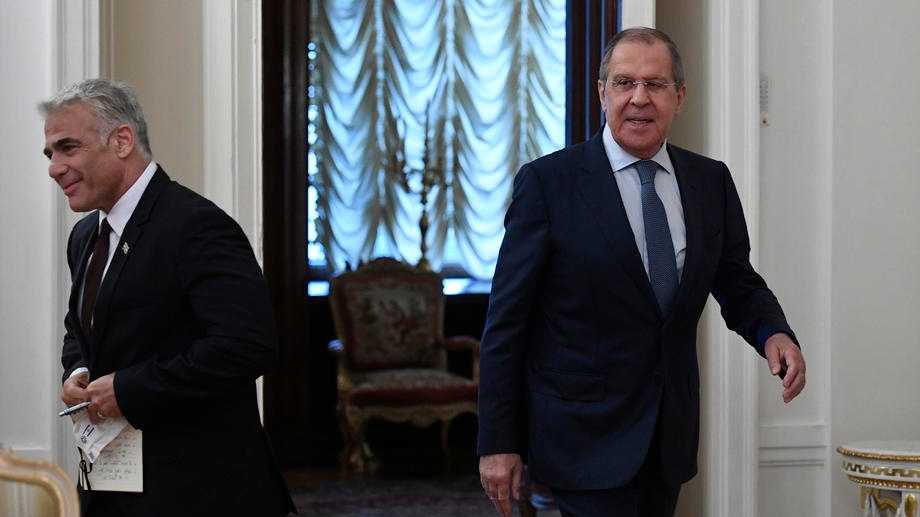Alwaght-The Ukrainian crisis that is caused by the Russian operation on February 24 has led to Russian-Israeli tensions. Over the past years, Russia has chosen lenience and flexibility with Tel Aviv in a bid to save the relationship with the Israeli government despite conflict of policies in the Syrian crisis. But the Israeli regime's support for Western positions and cooperation with the Ukrainian government in the war have angered Moscow and now Kremlin leaders are attempting to take revenge on Tel Aviv.
Since the initial days of the Russian special military operation in Ukraine, Israeli Foreign Minister Yair Lapid stated that Russian attack on Ukraine is a "serious violation of world order and Israel condemns this attack and is ready to provide humanitarian aid to Ukrainian citizens." At a meeting of the UN General Assembly in early March, the Israeli envoy voted to condemn Russia. There is also evidence that Tel Aviv has secretly put on the agenda arms shipments and also deployment of forces to Ukraine.
These actions and stances by the Israelis have infuriated the Russians. Moscow officials deemed Tel Aviv's stance as a sign of its support for neo-Nazism. Even recently, Russian Foreign Minister Lavrov's remarks about Hitler's Jewish blood have caused a great deal of controversy on the media and public opinion. All in all, it seems that the Russian leaders have taken steps to take revenge on the Israelis as they see their ingratitude. In the meantime, the most available tools for Moscow to punish Israel are as follows:
Strengthening ties with Palestinian groups
The clearest sign that Moscow has taken actual steps towards punishing Tel Aviv is the moves to bolster ties with the Palestinian resistance groups. Although there has always been a limited level of relations between Palestinian groups and parties with Moscow over the past decades, and the Kremlin has hosted them many times, in the new situation where the Ukraine crisis has become a major issue for tensions between Russia and Israel, communications of the Russians with the Palestinians carry messages.
Recently, Russian foreign ministry said Fatah and Palestinian Liberation Organization (PLO) official are set to visit Moscow soon. Also, the Russian deputy foreign minister expressed readiness of Russia to host national Palestinian reconciliation talks.
On May 5, Russian president's special envoy for the Middle East and Africa Mikhail Bogdanov, met with a delegation from Hamas.
"We have been in active contacts with all Palestinian parties," he said, adding: "So far, we have met with a number of representatives of Palestinian groups and parties, and we will continue to look forward to meeting with envoys from the Fatah movement and other organizations… These meetings are expected to take place this summer."
The Russian Foreign Minister Sergei Lavrov has also invited Hamas's political bureau chief Ismail Haniyeh to visit Moscow.
These moves by Moscow show that it is thinking of closeness to the Palestinians as the first step to revenge on the Israeli leaders and this agenda can widen in the future.
Limiting the leeway for Israeli airstrikes in Syria
There is more Russia can do to punish the Israeli regime and it is restriction of the Israeli open hand in Syria. As the first step taken shortly after anti-Ukrainian campaign began, Moscow announced it does not recognize the Israeli sovereignty of the occupied Syrian Golan Heights, which Tel Aviv annexed in 1981 and the US recognized as the Israeli territory in 2019. The Russian-Israeli relations went strained since Tel Aviv announced the need to set up a task force to monitor the developments in the Ukraine war. In response, Moscow declared Golan Heights an "integral part of Syria."
From another aspect, the anti-Russian Israeli positions have made the continuation of the leeway for Israeli airstrikes in Syria shrouded in uncertainty. Over the Syrian civil war years, the Israeli regime has carried out airstrikes on the positions of the resistance forces in illegal actions with Moscow's relative silence and ignorance. But because of new developments, Moscow will definitely impose significant restrictions on the Israeli actions in Syria. In the near future, one can clearly predict Moscow's tough stance against the Israeli aggression on Syria.
Boosting cooperation with and support for Iran
Another choice available to Moscow for anti-Israeli revenge is cooperation boost with Iran, Israel's archenemy in the region. Moscow's backing to the Iranian stances in the nuclear talks can play an enormous role in undermining the Israeli stances on the talks. Expanding security and military cooperation between Moscow and Tehran can deal another Russian blow to Tel Aviv.
Legal pressures on Tel Aviv
Veto right at the UN Security Council has always been a source of power for its holders. Moscow as a holder of this right has the power to put legal pressures on actors on the world stage. Russia has always been relatively passive and even lenient to UN resolutions condemning the Israeli crimes against humanity and illegal settlement projects in the occupied Palestinian territories. However, driven by the new conditions, Moscow is expected to condemn with more determination the Israeli crimes via the channel of the Security Council, a policy legally biting to Tel Aviv.



























